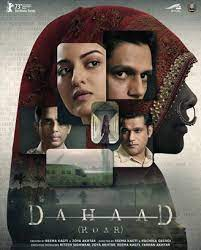The director-producer duo of Reema Kagti and Zoya Akhtar are a formidable team. They have produced a body of socially relevant content in both films as well as OTT streaming platforms.
This time they put their heft behind a solid web series that takes a long, hard look at class divide, caste discrimination, female oppression, misogyny, sexual abuse, and serial killing. Kagti co-directs this amazing series with Ruchika Oberoi.
The setting is in rustic Rajasthan, in the small, fictitious town of Mandawa, where folks moan the birth of a female child, and wait for someone to take the girl off their hands as soon as she grows up. Girls are worse than cattle here, they are just burdens, plain and simple.
 |
| Image source: Wikipedia |
Into this sordid scenario, comes a respectable college professor with a roving eye and a twisted mental make-up. The stage is set for a series of cleverly staged, carefully planned, meticulously carried out series of cold-blooded murders.
Yet, such is the status of the victims - all plain-looking, middle-class, ordinary girls of backward caste families, that no one notices or reports their absence. Not till the religious angle is cooked up, and the police gets political thrust to act.
Bit by bit, a team of dogged police officers dig out the dirt behind the twenty six missing girls that no one has reported about. All the missing girls are unmarried, over-age according to their families, unwanted and easily dispensable. That is why, when they disappear one fine day, leaving behind a vague letter, the families assume they have run off with a random guy and heave a sigh of relief. Sad, but that's exactly how women are still considered in hinterland India.
The series does well to focus more on the social aspect of the crime, rather than the suspense and thrill factor. Though it is filled with a sense of urgency and foreboding, the examination of the criminal mindset, particularly in sexual crimes is quite apt. The sense of privilege, the moral policing, the deep-set patriarchal mindset, and lastly, the absolute lack of remorse, set these offenders apart.
 |
| Image source: YourStory |
All in a day's work or rather, a weekend's sojourn for the respectable guardian of society, who feels girls need to be taught their place for being "morally lax".
Functioning more like a docu-series that unearths ugly truths, Dahaad punches you in the gut. It shows you the mirror, it shows you how half of India still functions. We read of women being killed/raped/mutilated almost daily, don't we? Those are mere statistics for us, here they come alive.
And what is most commendable, the series humanizes the police. The police personnel are depicted with a rare sensitivity and compassion. They flounder, they fail, they sin, but they are human enough to acknowledge when they are wrong. And yes, they have a conscience and a spine.
Kudos to the entire team of Dahaad - particularly, Gulshan Deviah, Sonakshi Sinha, Sohum Shah, and Vijay Verma. They have lived their roles on screen. This show will go down as one of the best web series in Indian history.
#DahaadOnAmazonPrime
#DahaadWebSeries
#ZoyaAkhtar
#ReemaKagti
#RuchikaOberoi
#SonakshiSinha
#VijayVerma
Comments
Post a Comment